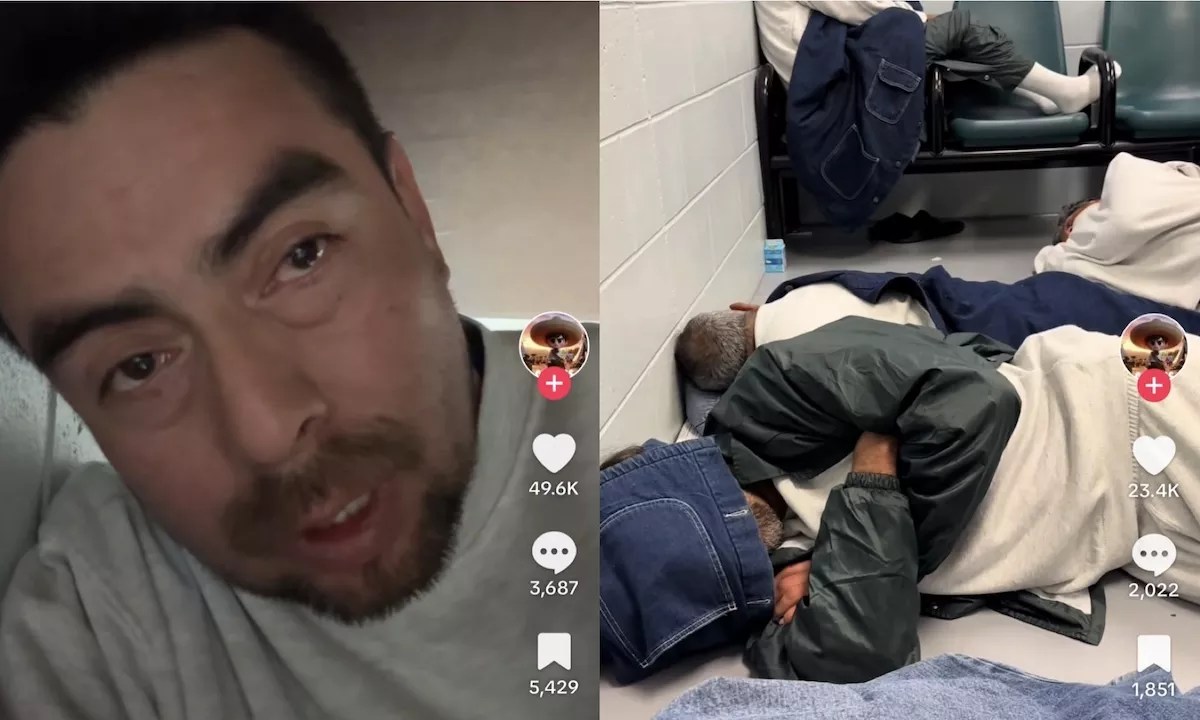
Screenshots via @osiriss982/TikTok

Audio By Carbonatix
Earlier this week, a man posted a TikTok video saying he’s inside Miami’s Krome North Service Processing Center, commonly known as the Krome Detention Center, an immigration detention facility. He appeared to be recording while crouching beneath a piece of furniture, on the verge of tears, and his voice sounded desperate.
“We’re practically kidnapped. We are in the process of deportation, but we have been here for more than 20 days. There are people who have been here for more than a month with no communication,” he says in Spanish.
He then pleads with whoever is listening.
“Please help us.”
The man even asks the Mexican president for assistance.
“Claudia Sheinbaum, if you see this, please support us,” he says, noting that there are many Mexicans in the facility. He then implores viewers to share the video, which had amassed 2.9 million views at this time of this reporting.
The video is one of four clips he recently shared, apparently filmed inside a U.S. Immigration and Customs Enforcement (ICE) facility in west Miami-Dade County. Another short clip shows a handful of detainees sleeping on the concrete floor of the detention center’s waiting room.
As ICE has ramped up its immigration enforcement under pressure from the Trump administration, immigration detention centers across the country have become overcrowded – seemingly including Krome, which has a bleak history of detainee abuse allegations. New Times spoke with both an attorney and ex-detainee who say they recently witnessed poor conditions such as overcrowding, lack of basic necessities like food and water, and long waits for processing.
An immigration attorney (who spoke with New Times on the condition of anonymity) says she visited a client at Krome this week and saw what she described as a “humanitarian disaster.”
Not only were the dorms severely overpopulated, she says, but there also appeared to be a food shortage at the detention center – which became evident when she saw a guard serve her client a meal consisting solely of rice and bread.
Another client, she says, told her that he slept on the floor for 11 days when he was first brought in.
“I was sitting in my visitation room and there were people knocking for me to get a guard because they had no water,” she says.
A 26-year-old man (who also spoke with New Times on the condition of anonymity) says he was first brought to Krome last summer and processed out of the facility earlier this month.
While he initially found the living conditions acceptable when he arrived last year, he says they worsened significantly over the past few months as the facility grew more crowded with detainees.
He recalls guards serving food to detainees less often, with some people going as long as 12 hours without a meal. People had to sleep on cold floors and benches without blankets, and in some cases were so cramped that they nearly slept on top of each other, he says. The cramped and desperate conditions even led to fights.
Although he was processed within hours of his arrival, he says that by the time he left, some people were spending weeks awaiting processing.
“Because we are not U.S. citizens, they treat us like we are not people,” he says in Spanish.
The man worries the guards aren’t equipped to deal with what he describes as “unstable conditions.”
“They are playing with people’s lives,” he says.
He says he knew two people who recently died while being held at Krome, including 44-year-old Maksym Chernyak, a Ukranian man who suddenly fell ill and died at Krome last month.
Chernyak, one of three people to die at the facility since last October, was brought to Krome on February 2 and taken to a hospital just two weeks later, after he began vomiting and having seizures, according to ICE. The Miami-Dade County Medical Examiner tells New Times that he died of “Complications of Hypertensive Intracerebral Hemorrhage” (AKA a stroke).
Chernyak’s wife told NBC 6 that she believes her husband was not properly cared for at Krome when he fell ill.
An ICE spokesperson sent New Times the following statement:
Ensuring the safety, security, and well-being of individuals in our custody is a top priority at ICE. Some ICE facilities are experiencing temporary overcrowding due to recent increases in detention populations. We are actively implementing measures to manage capacity while maintaining compliance with federal standards and our commitment to humane treatment.
ICE is using multiple strategies to address these challenges, including the transfer of detainees to alternative facilities with available capacity, expedited case processing where appropriate, and coordination with federal, state, and local partners to ensure continued oversight and accountability. Additionally, we remain committed to providing necessary medical care, access to legal resources, and safe living conditions for all individuals in our custody.
ICE will continue to evaluate detention needs and make adjustments as necessary to ensure the integrity of our immigration enforcement operations while upholding our duty to treat all individuals with dignity and respect.
As a law enforcement agency, ICE expects all employees to adhere to the highest standards of professional conduct and to demonstrate integrity and professionalism in all aspects of their work. ICE takes any allegations regarding professional misconduct seriously. If you have information about a specific individual, ICE requests that any information about the incident be shared so the agency may look further into the matter.